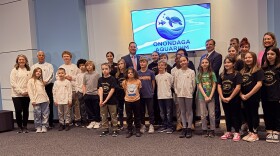A new report released by Hamilton College shows refugee communities in Utica continue to be heavily affected by the COVID-19 pandemic.
The 2024 Refugee Community Impact Report analyzes how refugees in Utica from Somalia, Myanmar, and Bosnia are facing a number of challenges in the wake of COVID-19.
The study was conducted by Hamilton College professors Stephen Ellingson and Erol Balkan in conjunction with On Point for College.
Researcher Stephen Ellingson, a sociology professor at Hamilton, said it’s a different way to look at the phrase “long COVID.”
"What we want to kind of communicate is the hidden costs of the endurance of the pandemic, and because the pandemic is under control, we've just kind of (said) 'It's all over. It's done,' but it's not done."
The study found that the COVID-19 era took a major toll on housing costs and stability. During the first year of the pandemic, 72 percent of those surveyed reported they spent more than 70 percent of their income on housing. That number remains the same in 2024.
Ellingson said the effects of that are far reaching.
"If you think about, if I'm spending all this money on housing, what am I not being able to spend money on?” he said. “Healthcare, food, and we know that children who live in poverty or don't have adequate diets, do less well in school."
The study also showed more than one-third of respondents said they lost their jobs, and more than half experienced reduced work hours. While employment has started to rebound, Hamilton College Economics Professor Erol Balkan said continued high costs have placed significant burdens on Utica’s refugee community, and likely beyond.
"One of the interesting facts about communities in Utica is their contribution to the local economy, not only in terms of providing labor, but also of course on the local economy in terms of their expenditures," Balkan said.
One of the study’s more promising findings was an easing of the negative effects that COVID-19 had on children’s education. During the first year, 61 percent of respondents said their children’s schooling was harmed. Last year, less than a quarter of parents worried about children falling behind in school.
The study also found different refugee communities were affected in different ways. For example, Bosnians, who have lived in Utica longer than the other two groups, were less affected by challenges with housing and employment. Refugees from Somalia were found to experience the most negative effects when it came to housing and unemployment.
The report also made recommendations for how to help. Balkan said he’d like to see more resources dedicated to helping refugee communities and possibly more public-private partnerships.
"Maybe to create an environment where these populations would have more access, not only to low cost housing, but also low cost mortgages," he said,
And both professors believe if the community can make things better for refugee populations, everyone in Utica can benefit.
"Everybody will be affected by the outcome, so we need to think about the entire community, rather than communities within the larger community that we live in," Balkan said.
"These are our neighbors,” said Ellingson. “We're all better off if we're helping each other."
From this point, Balkan and Ellingson said they hope to expand their research to see how COVID-19 continues to affect the broader population in Utica.
Read the full report here.








